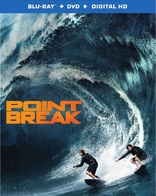Point Break Blu-ray Movie
HomePoint Break Blu-ray Movie 
Blu-ray + DVD + UV Digital CopyWarner Bros. | 2015 | 114 min | Rated PG-13 | Mar 29, 2016
Movie rating
5.7 | / 10 |
Blu-ray rating
| Users | 3.8 | |
| Reviewer | 2.0 | |
| Overall | 2.7 |
Overview
Point Break (2015)
A young undercover FBI agent infiltrates a gang of thieves who share a common interest in extreme sports. A remake of the 1991 film, "Point Break".
Starring: Edgar Ramírez, Luke Bracey, Ray Winstone, Teresa Palmer, Matias VarelaDirector: Ericson Core
| Action | Uncertain |
| Sport | Uncertain |
| Crime | Uncertain |
Specifications
Video
Video codec: MPEG-4 AVC
Video resolution: 1080p
Aspect ratio: 2.40:1
Original aspect ratio: 2.39:1
Audio
English: DTS-HD Master Audio 7.1 (48kHz, 24-bit)
French (Canada): Dolby Digital 5.1
Spanish: Dolby Digital 5.1 (640 kbps)
Portuguese: Dolby Digital 5.1
Russian: Dolby Digital 5.1
Japanese: Dolby Digital 5.1
English: Dolby Digital 5.1 (640 kbps)
English: Dolby Digital 5.1 (640 kbps)
U.S. & U.K. descriptive; Japanese is hidden
Subtitles
English SDH, French, Japanese, Portuguese, Spanish, Russian
Discs
50GB Blu-ray Disc
Two-disc set (1 BD, 1 DVD)
UV digital copy
DVD copy
Packaging
Slipcover in original pressing
Playback
Region A (B, C untested)
Review
Rating summary
| Movie | 1.0 | |
| Video | 4.0 | |
| Audio | 4.5 | |
| Extras | 1.0 | |
| Overall | 2.0 |
Point Break Blu-ray Movie Review
100% Pure Adrenaline Goes Flat
Reviewed by Michael Reuben March 25, 2016The end credits for Ericson Core's remake of Point Break run almost fourteen minutes, which is an appropriate coda to a film that, despite being busy and loud, feels as sluggish as that interminable crawl. Director Core and screenwriter Kurt Wimmer (Ultraviolet) borrowed the storyline from Kathryn Bigelow's 1991 film of the same name, then stripped it of every element that has made the original an action classic, despite its initially poor reception. Bigelow brought her distinctive kinetic style to such genre staples as bank robberies, car chases and foot pursuits, and she understands that action sequences aren't thrilling unless they involve characters that lure the audience along for the ride. All Core and Wimmer have to offer is a stuntman's highlight reel padded to feature length with token exposition and complete disregard for anything resembling credible motivation. Their remake died at the box office, and I will be surprised if it attains anything resembling the home video acceptance achieved by Bigelow's original. Its only possible appeal is as demo material for a home theater surround system, and there's already plenty (and better) to choose from.

Bigelow's 1991 Point Break concerned a gang of thrill-seekers who robbed banks both for the adrenaline rush and to finance a fringe lifestyle. Their charismatic leader spouted vaguely spiritual, New Age justifications for their activities, but there was never any question that he and his gang were criminals and parasites, no matter how charming (and at least one of them was a violent thug). The story's core conflict involved an FBI agent who infiltrated the gang, then found himself seduced by their lifestyle, despite a clean-cut, straight-arrow background (college quarterback, law school graduate, top in his class at Quantico). As the lawman and the cult leader alternated between friendly competition and deadly confrontation, a complex relationship developed, but the key to the FBI man's salvation turned out to be a woman who saw through the charades ("There's too much testosterone here" was her diagnosis, and she was right). The ride was fun while it lasted, but in the words of the song that played over the closing titles, nobody rides for free.
Wimmer and Core dispense with everything that made Bigelow's film compelling. First, they remove the core conflict between the agent and his target. The remake's Johnny Utah (Luke Bracey, compared to whom Keanu Reeves looks like a graduate of the Actors Studio) begins as an adrenaline junkie, pursuing a life of "extreme sports" like the agents recruited in the XXX franchise. After the death of a fellow enthusiast (Max Thieriot) in a pre-credit sequence, Utah develops a conscience and joins the establishment in what is supposed to be an extended act of atonement. Seven years pass off-screen before Utah returns newly credentialed with a B.A. and law degree and joins the FBI, where he's trained by Instructor Hall (Delroy Lindo).
But when the Bureau is confronted with daring crimes committed by "extreme sports" enthusiasts, Utah immediately drops back into his element as if he'd never left. This Point Break eliminates the lengthy investigation (and blind alleys) that allowed the original's Utah to gain a credible footing in law enforcement; it also reduces his partner and mentor, a senior agent named Pappas (Ray Winstone), to little more than an extended cameo, instead of the anchor among the good guys provided by the original character (played by Gary Busey, when he was still a credible screen presence). In this film, the investigation takes no time at all, because Core doesn't want to waste effort on character or motivation. He's in too much of a hurry to get to the stunt sequences, which are so over-the-top that even the Bond franchise might hesitate to include them.
The remake's Bodhi (Edgar Ramirez, Joy) is an eco-terrorist whose motivation vacillates between seeking nirvana and "giving back" to the earth. He's so unconvincing as a guru that Wimmer's script has to posit a dead predecessor named Osaki to inspire Bodhi with a list of "ordeals" marking the path to enlightenment. Known as the "Osaki 8", these tasks are supposed to be the outline for Bodhi's exploits, but even when they're spelled out on a blackboard late in the film, it's impossible to comprehend how such fortune-cookie abbreviations as "Emerging Force" and "Birth of Sky" lead to massive thefts of cash and diamonds. This Bodhi doesn't have the justification of needing to support himself financially, since his adventures are funded by a French-Arab billionaire playboy (Nicolai Kinski). And don't even ask why the FBI never thinks to track the massive expenditures required to bankroll these undertakings. You might as well ask how the IMF affords its apparently limitless supply of high-priced tech.
The members of Bodhi's gang receive such scant attention that they barely register as individuals. Two actors from the original gang, James Le Gros and Bojesse Christopher, appear in cameos, but the appearance only serves as a reminder of how effectively Bigelow individuated Bodhi's tight-knit crew. The love interest here is Samsara (Teresa Palmer), and except for her sexual encounter with Utah, she's just one of the guys: another extreme sports addict pursuing the same elusive rapture as Bodhi. With or without a romance, Utah remains a plot function instead of a character, alternately nipping at his FBI bosses like a puppy dog about how desperate he is to pursue the case and reverting to the thrill-seeker he's always been—which makes you wonder how he'll cope when the Bureau assigns him to more routine and prosaic duties investigating "regular" crimes.
Point Break contains some undeniably remarkable action sequences: an extended flight from a mountain top in wingsuits, snowboarding down a vertical slope, bare-handed rock climbing that recalls the opening of Mission: Impossible II, and surfing scenes where the waves have formed in the deep ocean far from land and reach heights that dwarf even the Australian monster at the end of Bigelow's film. But the pounding repetition of such feats quickly wears out their ability to inspire awe, even if, as the publicity proudly asserts, many of the stunts were done for real, with little or no CGI. Good action sequences need credible characters who can make an audience feel the danger. Bigelow understood that, but Core doesn't have a clue.
Point Break Blu-ray Movie, Video Quality 
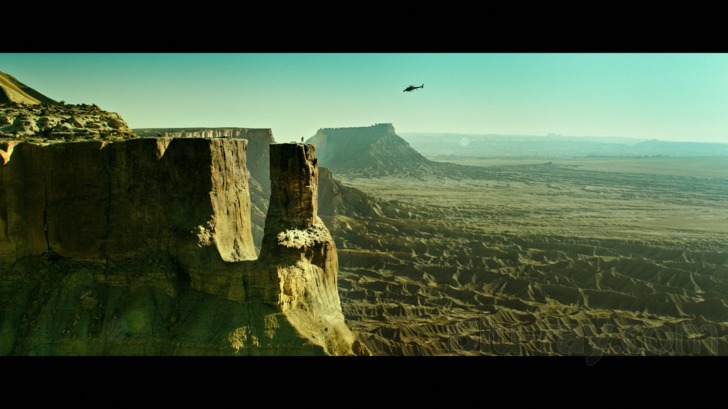
Core began as a cinematographer on such films as
Payback and the inaugural installment of The
Fast and the Furious. He served as his own director of photography on Point Break, shooting
primarily on Alexa, supplemented by a Red Epic Dragon and various specialized cameras to
capture stunt sequences. Post-production was completed on a digital intermediate at 2K, but
Warner has already slated the film for an upcoming 4K release.
Warner's 1080p, AVC-encoded Blu-ray sports a sharp, clear and detailed image, but the most
prominent feature of Point Break's imagery is the stylized palette, which might be termed "cyan
and ochre". Although the disc's extras and other PR materials stress the diverse and exotic
locations where the stunt sequences were filmed, Core has opted to make them look more similar
than different by casting a yellowish tinge over much of the frame and shifting the blues toward
green. Flesh tones are never natural, the sea and sky are rarely deep blue and even the greenery
turns yellow (and the white snow turns blue-ish). I'm not one to insist on naturalism in cinema,
but when the artificiality of a film's colors continually calls attention to itself, distracting from
the action and story, one can reasonably question whether digital manipulation has gone too far.
For good or ill, the Blu-ray appears to reflect the theatrical release and therefore can't be faulted
on technical grounds, but Point Break is an ugly film.
The mastering habits of Warner's theatrical division appear to be improving. Point Break has
been mastered at an average bitrate of 28.14 Mbps, which is very good for digitally acquired
material, and the compression deals effectively with the many challenging scenes of rapid action
in panoramic settings.
Point Break Blu-ray Movie, Audio Quality 
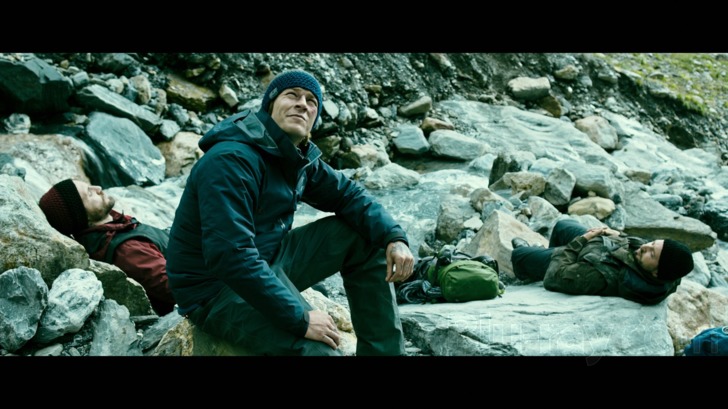
Warner's press release for Point Break promised a Dolby Atmos track, but the film's credits do not bear the Atmos logo, and no such track appears on the disc. An Atmos remix wouldn't make Point Break a better film, but it might have sold additional units to owners of Atmos-equpped systems. In any case, the film's 7.1 theatrical mix, encoded in lossless DTS-HD MA, does not disappoint. It's a typically loud, boisterous action-film track that pummels the viewer from all sides with wind, waves, flying debris and impacts of multiple varieties. Both the subwoofer and the surround array are effectively used, and if you happen to stop noticing after a while, it's only because your ears have adjusted to the sonic assault. (The same phenomenon occurs in Transformers films, which are similarly stylized and cartoonish.) Dialogue is occasionally smothered in the mix, but I doubt many viewers will care, since the dialogue is neither memorable nor important. The aggressive action score is by Tom Holkenborg, a/k/a "Junkie XL" (Mad Max: Fury Road), and the soundtrack includes enough genre-spanning tunes to have spawned a CD.
Point Break Blu-ray Movie, Special Features and Extras 
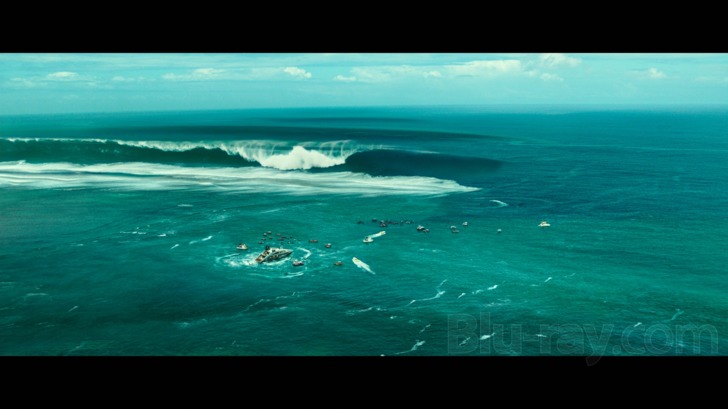
- POINT BREAK (1080p; 1.78:1): Each of these brief promotional shorts concerns a different stunt sequence.
- Rock Climbing (1:52)
- Wingsuit Flying (2:16)
- Snowboarding (1:58)
- Motocross (1:55)
- Deleted Scenes (1080p; 2.35:1; 8:17): A "play all" function is included.
- Airport
- Utah Skateboards
- Utah and Pappas at the Train Station
- Moto X
- Trailers (1080p; 2.35:1)
- Domestic Trailer #1 (2:35)
- Domestic Trailer #2 (2:34)
- Bonus Trailer: At startup, the disc plays a trailer for Batman v Superman: Dawn of Justice, followed by the usual Warner promo for digital copies.
Point Break Blu-ray Movie, Overall Score and Recommendation 
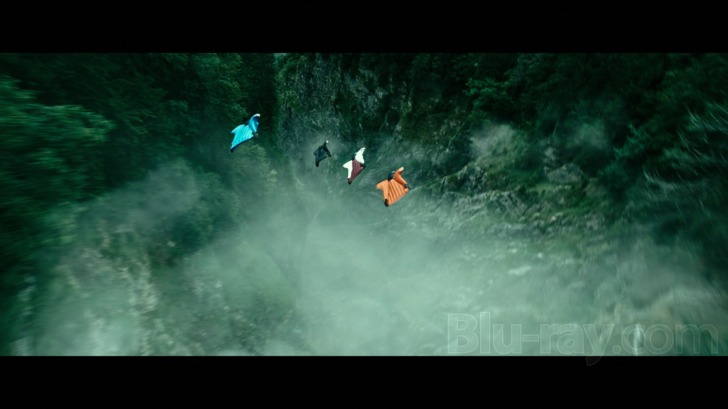
I don't mind remakes if they're good, and reconceiving Bodhi and his clan as extreme athletes
seemed like an inspired idea when I first heard it. I sat down to watch Point Break hoping that its
failure at the domestic box office resulted from an overcrowded release season and that, like
Bigelow's 1991 original, it would show its mettle on home video. After watching the film, I
don't foresee a repeat of Bigelow's belated triumph (although the $100 million overseas box
office suggests that Point Break's life may be prolonged abroad). Core and Wimmer have
jettisoned everything that made Bigelow's film worth watching, including good performances. If
you must see it, rent it.
Other editions
Point Break: Other Editions
Similar titles
Similar titles you might also like

Fast & Furious
2009

A Good Day to Die Hard
Extended Cut
2013

Skyscraper 4K
2018

The Transporter Refueled
2015

Sleepless
2017

2 Fast 2 Furious 4K
2003

American Heist
2014

The Sweeney
2012

Drive Hard
2014

Reprisal
2018

2 Guns 4K
2013

Faster
2010

Today You Die
2005

Wrong Side of Town
2010

Den of Thieves
2018

Fast Five 4K
2011

Need for Speed
2014

The Fate of the Furious
2017

xXx: State of the Union
2005

Baywatch 4K
Extended Cut
2017
